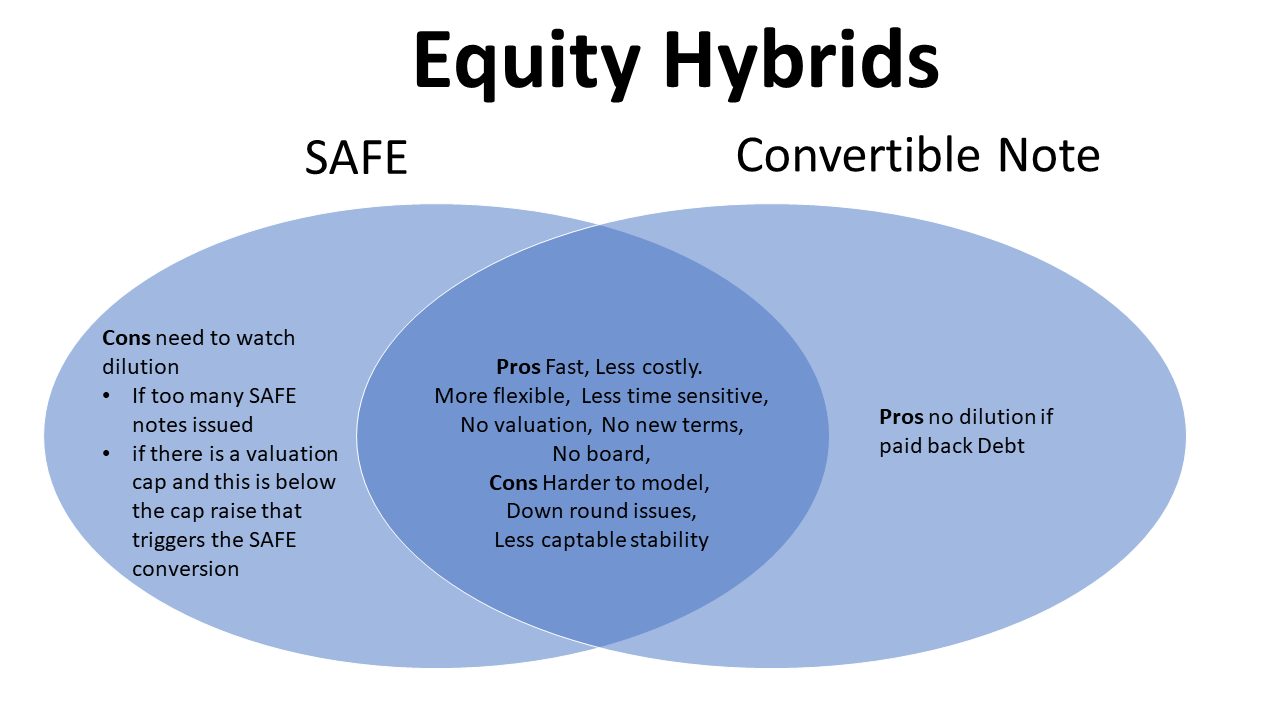Equity Hybrids

Today I want to talk about the equity hybrids, SAFE (simple agreement for future equity) and convertible notes.
SAFE
A SAFE is a Simple Agreement for Future Equity.
It has a conversion to equity generally based on a future liquidity event like a formal cap raise. For example, it will convert to equity at say a 15% discount to the share price on a cap raise in excess of $Xm. This avoids the issue of a valuation of the business at the early start-up stage.
It is not a loan and does not get interest.
SAFEs don’t provide immediate ownership in the company. This means investors won’t have equity or voting rights until the SAFE converts, which might not happen. If the startup fails before the conversion event, SAFE investors may end up with nothing.
Typically for Pre Seed, Seed and Bridging between rounds.
Pros ● Fast ● Less costly ● More flexible ● Less time sensitive ● No valuation ● No new terms ● No board
Cons ● Harder to model ● Down round issues ● Less captable stability ● need to watch dilution if too many SAFE notes issued ● need to watch dilution if there is a valuation cap and this is below the cap raise that triggers the SAFE conversion
Convertible Note
A convertible note refers to a short-term debt instrument (i.e. loan usually with full creditor rights) that can be converted into equity at a later date.
It has a conversion to equity generally based on a future liquidity event like a formal cap raise. For example, it will convert to equity at say a 15% discount to the share price on a cap raise round in excess of $Xm. This avoids the issue of a valuation of the business at the early start-up stage.
Will have a maturity date which may trigger a repayment obligation.
Interest may need to be paid (often monthly) or may be capitalized at either paid at maturity or rolled into conversion process.
Can be used at early stage when valuation is uncertain. Also sometimes used as bridge financing between equity rounds to extend the business runway.
Convertible notes don’t provide immediate ownership in the company. This means investors won’t have equity or voting rights until the convertible note actually converts, which might not happen
If the startup fails before the conversion event, convertible note holders are treated like any other creditor.
Pros ● Fast ● Less costly ● More flexible ● Less time sensitive ● No valuation ● Possibly no dilution if paid back ● No new terms ● No board
Cons ● Harder to model ● Down round issues ● Less captable stability ● Debt
Contact Wayne on wayne@arealcfo.com.au or 0412 227 052.
Click on the below buttons to access free Resources developed by Wayne Wanders, A Real CFO to help your business scale and grow profitably
Want a confidential discussion on your business situation, help with your grant application or to learn more about my Outsourced CFO Services, simply email me at wayne@aRealCFO.com.au or call me on 0412 227 052

